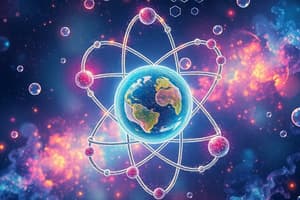Podcast
Questions and Answers
What is matter?
What is matter?
Anything that has mass and occupies space.
What is chemistry?
What is chemistry?
The study of matter and its interactions.
Which shell holds the least number of electrons?
Which shell holds the least number of electrons?
- 1st shell (correct)
- 2nd shell
- 3rd shell
- None of the above
Which of the following elements constitutes the largest percentage of the human body?
Which of the following elements constitutes the largest percentage of the human body?
What defines an element?
What defines an element?
What is an isotope?
What is an isotope?
Which of the following is NOT a common application of isotopes?
Which of the following is NOT a common application of isotopes?
What is a mixture?
What is a mixture?
What is a solute?
What is a solute?
What is concentration in relation to a solution?
What is concentration in relation to a solution?
How many protons does a sodium atom have?
How many protons does a sodium atom have?
What is an ion?
What is an ion?
What determines how an atom interacts with other atoms?
What determines how an atom interacts with other atoms?
Study Notes
Matter and Chemistry
- Matter is defined as anything that possesses mass and occupies space.
- Chemistry involves the study of matter and its interactions.
Atoms and Elements
- An atom is the smallest unit of matter preserving original properties.
- Atomic structure includes:
- 1st shell: holds 2 electrons
- 2nd shell: holds up to 8 electrons
- 3rd shell: can hold up to 18 electrons, usually stable at 8 electrons
- An element is a substance that cannot be chemically broken down into simpler substances.
- Elements are defined by their atomic number, which indicates the number of protons.
- The periodic table organizes elements by chemical symbols, typically derived from their names (e.g., H for Hydrogen).
Human Body Elements
- Key elements making up the human body include:
- Oxygen: 65%
- Carbon: 18%
- Hydrogen: 10%
- Nitrogen: 3%
- Minerals: 4%
Isotopes
- Isotopes have identical atomic numbers but different mass numbers.
- Some isotopes are highly energetic and unstable, emitting radiation, utilized in nuclear medicine.
- Applications of isotopes include:
- Cancer radiation therapy
- Radiotracers
- Treatment of thyroid disorders
Mixtures
- A mixture consists of atoms from two or more elements physically intermixed.
- Components of a solution:
- Solute: the substance that dissolves
- Solvent: the medium in which the solute dissolves (water is the primary solvent in the human body)
- Concentration indicates the amount of solute in a solution (e.g., 10 grams of salt in 90 milliliters of water = 10% salt solution).
- Solutions are mixtures formed without chemical changes, allowing for physical separation.
Molecules and Compounds
- A molecule forms when two or more atoms chemically bond together.
- A compound consists of two or more different elements bonded (e.g., H₂O).
Atomic Interaction
- Valence electrons determine how atoms bond with others.
- Example of ionic bonding: Sodium (Na) transfers its outer electron to Chlorine (Cl), resulting in charged particles known as ions.
- Sodium has 11 protons and upon losing one electron, becomes a positively charged ion with a +1 charge.
Studying That Suits You
Use AI to generate personalized quizzes and flashcards to suit your learning preferences.
Related Documents
Description
This quiz explores the fundamental concepts of matter and its significance in chemistry. It covers definitions, atomic structure, and the properties of matter. Test your knowledge on the smallest units of matter and their interactions!





